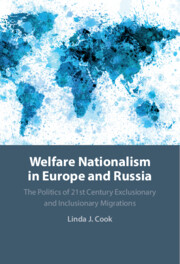 Welfare Nationalism in Europe and Russia
Welfare Nationalism in Europe and Russia Russia’s Compatriot Resettlement Program and Poland’s Karta Polaka
from Part IV - Inclusionary Migrations
Published online by Cambridge University Press: 14 November 2024
Chapter 7 turns to ethnic return migrations, Russia’s Compatriot Resettlement Program and the Poland’s Karta Polaka (Pole’s Card) program. In these cases migrants entered ‘virtuous inclusionary cycles’ : societies were receptive to them as co- ethnics, political elites sponsored and financed their resettlement and media, mostly state-controlled in both states, lauded their contributions. The chapter analyzes the motives of the Polish and Russian governments in sponsoring re-settlers, including demographic replacement for declining populations, workers to fill labor shortages, and symbolic nationalist political agendas. It shows that welfare nationalist grievances did emerge over the resetlers’ social privileges and nationals’ competition with them for scare social resources. There were also disputes over the boundaries of national belonging. In sharp contrast to the exclusionary migrations, Russian and Polish political elites managed and mitigated grievances rather than mobilizing them for political gain. Resettlers confronted obstacles to integration: severe restrictions on residence and job rights in Russia, limited language fluency in Poland. Still, inclusionary policies gave resettlers social, economic and civil rights denied to those in exclusionary migrations.
To save this book to your Kindle, first ensure [email protected] is added to your Approved Personal Document E-mail List under your Personal Document Settings on the Manage Your Content and Devices page of your Amazon account. Then enter the ‘name’ part of your Kindle email address below. Find out more about saving to your Kindle.
Note you can select to save to either the @free.kindle.com or @kindle.com variations. ‘@free.kindle.com’ emails are free but can only be saved to your device when it is connected to wi-fi. ‘@kindle.com’ emails can be delivered even when you are not connected to wi-fi, but note that service fees apply.
Find out more about the Kindle Personal Document Service.
To save content items to your account, please confirm that you agree to abide by our usage policies. If this is the first time you use this feature, you will be asked to authorise Cambridge Core to connect with your account. Find out more about saving content to Dropbox.
To save content items to your account, please confirm that you agree to abide by our usage policies. If this is the first time you use this feature, you will be asked to authorise Cambridge Core to connect with your account. Find out more about saving content to Google Drive.